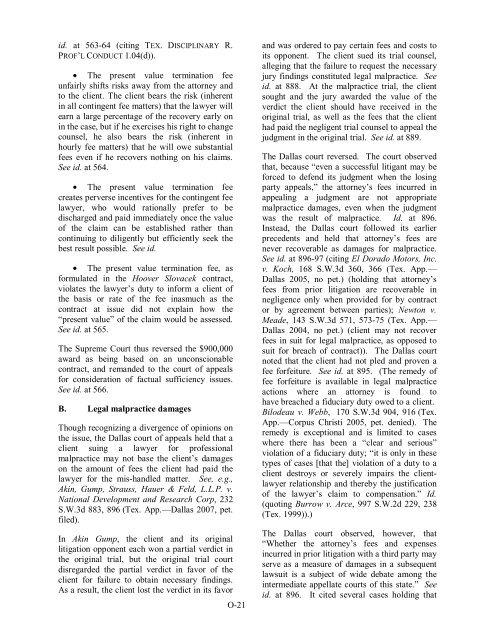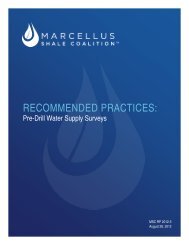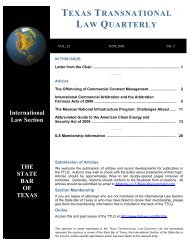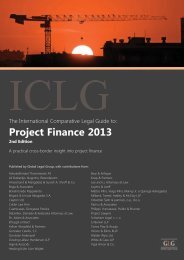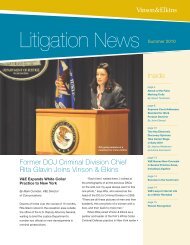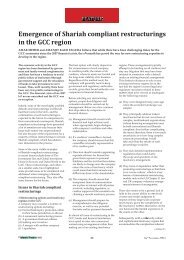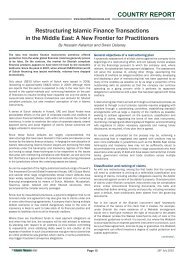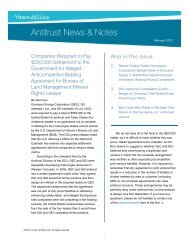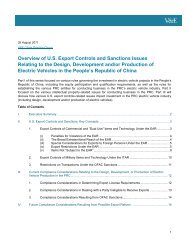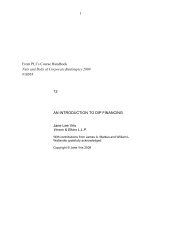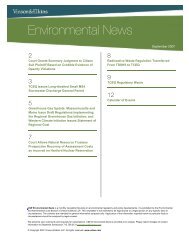Attorney's Fees Update - Vinson & Elkins LLP
Attorney's Fees Update - Vinson & Elkins LLP
Attorney's Fees Update - Vinson & Elkins LLP
Create successful ePaper yourself
Turn your PDF publications into a flip-book with our unique Google optimized e-Paper software.
id. at 563-64 (citing TEX. DISCIPLINARY R.<br />
PROF’L CONDUCT 1.04(d)).<br />
• The present value termination fee<br />
unfairly shifts risks away from the attorney and<br />
to the client. The client bears the risk (inherent<br />
in all contingent fee matters) that the lawyer will<br />
earn a large percentage of the recovery early on<br />
in the case, but if he exercises his right to change<br />
counsel, he also bears the risk (inherent in<br />
hourly fee matters) that he will owe substantial<br />
fees even if he recovers nothing on his claims.<br />
See id. at 564.<br />
• The present value termination fee<br />
creates perverse incentives for the contingent fee<br />
lawyer, who would rationally prefer to be<br />
discharged and paid immediately once the value<br />
of the claim can be established rather than<br />
continuing to diligently but efficiently seek the<br />
best result possible. See id.<br />
• The present value termination fee, as<br />
formulated in the Hoover Slovacek contract,<br />
violates the lawyer’s duty to inform a client of<br />
the basis or rate of the fee inasmuch as the<br />
contract at issue did not explain how the<br />
“present value” of the claim would be assessed.<br />
See id. at 565.<br />
The Supreme Court thus reversed the $900,000<br />
award as being based on an unconscionable<br />
contract, and remanded to the court of appeals<br />
for consideration of factual sufficiency issues.<br />
See id. at 566.<br />
B. Legal malpractice damages<br />
Though recognizing a divergence of opinions on<br />
the issue, the Dallas court of appeals held that a<br />
client suing a lawyer for professional<br />
malpractice may not base the client’s damages<br />
on the amount of fees the client had paid the<br />
lawyer for the mis-handled matter. See, e.g.,<br />
Akin, Gump, Strauss, Hauer & Feld, L.L.P. v.<br />
National Development and Research Corp, 232<br />
S.W.3d 883, 896 (Tex. App.—Dallas 2007, pet.<br />
filed).<br />
In Akin Gump, the client and its original<br />
litigation opponent each won a partial verdict in<br />
the original trial, but the original trial court<br />
disregarded the partial verdict in favor of the<br />
client for failure to obtain necessary findings.<br />
As a result, the client lost the verdict in its favor<br />
O-21<br />
and was ordered to pay certain fees and costs to<br />
its opponent. The client sued its trial counsel,<br />
alleging that the failure to request the necessary<br />
jury findings constituted legal malpractice. See<br />
id. at 888. At the malpractice trial, the client<br />
sought and the jury awarded the value of the<br />
verdict the client should have received in the<br />
original trial, as well as the fees that the client<br />
had paid the negligent trial counsel to appeal the<br />
judgment in the original trial. See id. at 889.<br />
The Dallas court reversed. The court observed<br />
that, because “even a successful litigant may be<br />
forced to defend its judgment when the losing<br />
party appeals,” the attorney’s fees incurred in<br />
appealing a judgment are not appropriate<br />
malpractice damages, even when the judgment<br />
was the result of malpractice. Id. at 896.<br />
Instead, the Dallas court followed its earlier<br />
precedents and held that attorney’s fees are<br />
never recoverable as damages for malpractice.<br />
See id. at 896-97 (citing El Dorado Motors, Inc.<br />
v. Koch, 168 S.W.3d 360, 366 (Tex. App.—<br />
Dallas 2005, no pet.) (holding that attorney’s<br />
fees from prior litigation are recoverable in<br />
negligence only when provided for by contract<br />
or by agreement between parties); Newton v.<br />
Meade, 143 S.W.3d 571, 573-75 (Tex. App.—<br />
Dallas 2004, no pet.) (client may not recover<br />
fees in suit for legal malpractice, as opposed to<br />
suit for breach of contract)). The Dallas court<br />
noted that the client had not pled and proven a<br />
fee forfeiture. See id. at 895. (The remedy of<br />
fee forfeiture is available in legal malpractice<br />
actions where an attorney is found to<br />
have breached a fiduciary duty owed to a client.<br />
Bilodeau v. Webb, 170 S.W.3d 904, 916 (Tex.<br />
App.—Corpus Christi 2005, pet. denied). The<br />
remedy is exceptional and is limited to cases<br />
where there has been a “clear and serious”<br />
violation of a fiduciary duty; “it is only in these<br />
types of cases [that the] violation of a duty to a<br />
client destroys or severely impairs the clientlawyer<br />
relationship and thereby the justification<br />
of the lawyer’s claim to compensation.” Id.<br />
(quoting Burrow v. Arce, 997 S.W.2d 229, 238<br />
(Tex. 1999)).)<br />
The Dallas court observed, however, that<br />
“Whether the attorney’s fees and expenses<br />
incurred in prior litigation with a third party may<br />
serve as a measure of damages in a subsequent<br />
lawsuit is a subject of wide debate among the<br />
intermediate appellate courts of this state.” See<br />
id. at 896. It cited several cases holding that


